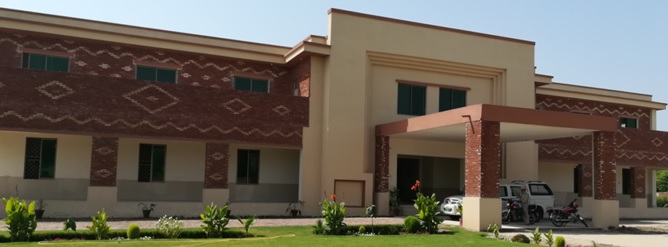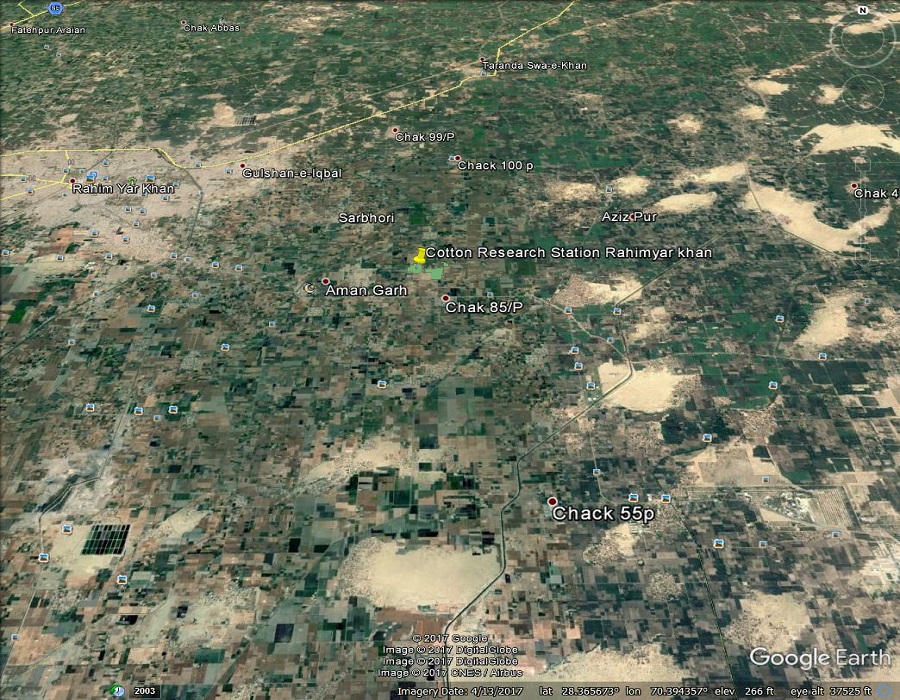Cotton Research Station, Khanpur, district Rahim Yar Khan is a prestigious research station of Southern Punjab, Pakistan. In 1978-79 this Institute was established in District Rahimyar Khan which was later on shifted to Tehsil Khanpur of same district. It works under the Ayub Agriculture Research Institute, Faisalabad, which is under the administrative control of Govt. of the Punjab. The basic purpose of Cotton Research Station, Khanpur is to boost up cotton production in the region through research and development. As Pakistan is an agriculture-based country and 70% of its employment directly generates through agriculture. Similarly, cotton is a cash crop of Pakistan. It provides fiber, food and shelter. It is also a cheaper source of kitchen fuel (Cotton sticks) in rural areas of Pakistan. World’s population is increasing very rapidly and in the current scenario where there is limited arable resources/land and finite resources of water we have to enhance our productivity, which is only possible through research and development. Cotton Research Institute is situated 5km away from the main city at Chak 4, Khanpur. It has a total area of 39.4 acres from which 8.4 acres covered with offices, sheds and residential buildings & others. 31 acres are used for crop cultivation. It has the facility of library and fiber technology laboratory.

Mission & Objectives
- Development of new cotton varieties.
- Cotton seed production and its provision to farmers
- New technology development and its dissemination.
- Field visits & provision of suggestion/strategies to deal with field issues related to cotton production.
- Varieties developed with brief description
Approved Varieties of CRI, Khanpur
|
Sr. No. |
Varieties |
Year of release |
G.O.T % |
S.L. (mm) |
Mic. (ų/inch) |
Strength |
|
1 |
RH-1 |
1990 |
31.5 |
29 |
3.9 |
103.7 (tppsi) |
|
2 |
RH-112 |
1996 |
34.3 |
27.6 |
4.6 |
95.1 (tppsi) |
|
3 |
RH-647 |
2016 |
40.2 |
28.3 |
4.2 |
31.5 (g/tex) |
|
4 |
RH-662 |
2018 |
39.9 |
29.1 |
4.3 |
35.1 (g/tex) |
|
5 |
RH-668 |
2018 |
39.4 |
28.8 |
4.5 |
34.4 (g/tex) |
Operational Plans
Development of new cotton varieties with better fiber traits, high yield and CLCuV resistance.
Strategies
- Breeding of elite cultivars.
- Development of appropriate management practices to assist the farmer for the enhancement of production.
- To solve current problems of grower by adopting different experiments.
- Seed quality management based on genetic purity, not just phenotypic purity.
- Management of growers challenges in cotton production.
- Evaluation of economic analysis of the farming practices i. e. risk assumptions, planting, tillage, weed control, insect control, yield and quality.
- Screening of different indigenous and exotic strains
On Going Research Activities
Breeding
- Maintenance and Enrichment of Germplasm
- Study of Filial Populations (F1 - F6)
- Preliminary Yield Trials (PYTs)
- Advance Yield Trials (AYTs).
- Effect of temperature and humidity on CLCuV incidence, seed cotton yield and fibre quality
- Provincial Coordinated Cotton Trial (PCCT)
- National Coordinated Varietal Trial (NCVT)
- Statistical Analysis
Agronomy
- Effect of different sowing dates on growth and yield of new genotypes of cotton
- Performance of different genotypes under different planting densities
- Role of different management practices on growth and yield of cotton
- Effect of topping on seed cotton yield at different plant heights of cotton
Entomology
- Studies on the Monitoring of Insecticide Resistance in Cotton
- Determination of number of pheromone traps per acre for effective monitoring of pink bollworm
- Monitoring of population of chewing bollworms of cotton through sex pheromone traps: To study the fluctuation of population of chewing insect pests of cotton through sex pheromone traps

